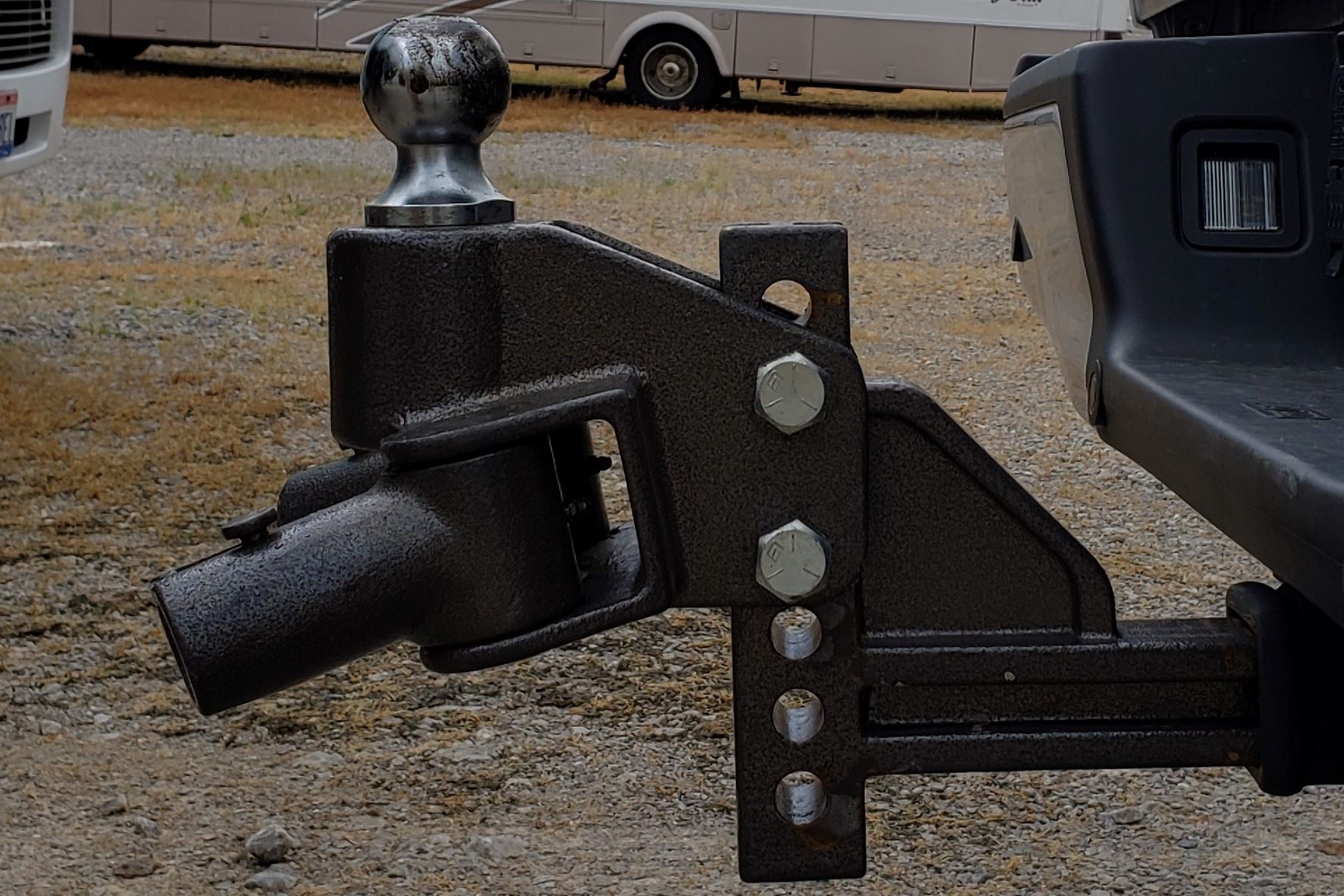Have you owned your weight distribution hitch for a long time? Do weight distribution hitches wear out?
Weight distribution hitches are critical components for safe towing. They help make sure that you can enjoy a stable ride even when you tow a trailer. Your safety on the road can depend on your WDH, so of course, you would want it to serve you for years faithfully.
It is extremely rare for a whole weight distribution system to wear down. Some parts of the hitches, however, can show signs of wear and tear throughout the years – make sure to carefully inspect the bar sockets, the bolts, the bolt holes, the bar ends, and the U-ball from time to time.
Weight distribution hitches can last you a lifespan if you manage to take great care of the component and if you have chosen the right type of system for your specific job. How to pick the right WDH to minimize wear and tear? You’ll find the answer and plenty of other helpful information below.
Don’t forget to check out our Recommended RV Equipment list!
Do Weight Distribution Hitches Wear Out?
Practically anything can wear down if you are constantly using it, but the chances are high that you won’t see a weight-distribution hitch wear out. But you must remember that the hitch consists of a few different components, some of which will experience much more stress than the others.
- The shank is an adjustable mount that you can move up or down to accommodate the system to the height of the vehicle.
- The head is the part that connects to the shank and the spring bars.
- The spring bars are the components that are responsible for evenly distributing the weight; they also help level the vehicle and the trailer.
- The hookup brackets’ main job is to mount the spring bars to the trailer frame securely.
For most common weight distribution hitch systems, the bars are engineered to be able to bend, so they should never break. The bar sockets, however, might show some signs of fatigue at one point, as well as the bolts and bolt holes. The great news is that replacing only the bolts is not too complicated and won’t cost you a small fortune.
The U-balls that connect to the tensioning chain might be the components you must keep an eye on if your system utilizes these types of components. They experience serious tension and movement and can show signs of wear and tear.
You might also want to check for wear at the bottom of the hitch head (this is the part that the spring bars rub against), the holes for the spring bars, and the bar ends.
How Long Does A Weight Distribution Hitch Last?
The hitches and the entire weight distribution system don’t have a specific lifespan. If you are doing a great job at maintaining the components and the system is properly rated for the towing setup, the hitches might end up serving you for decades.
Regularly inspect the components for corrosion, rust, and excessive wear. The good news is that if you have noticed that some components have worn out, you can replace them without getting a whole new weight distribution system.
When Should Your Weight Distribution System Be Replaced?
Regularly inspect every component of your weight distribution system for wear and tear. Pay attention not only to the actual components but also to the holes – some of those can become bigger over the years due to friction.
The hitches should be able to serve you for decades, especially if you have managed to properly install the system and choose the right one for your vehicle and trailer. It is extremely rare for the whole system to wear down. That said, you might have to replace a single component or two that show the most obvious signs of wear (like the hookup brackets, for example).
What Is a Weight Distribution Hitch?
It will be much easier to determine whether your hitches will wear out if you know exactly what the main job of these components is.
A weight-distribution hitch is a system engineered to ensure a stable ride when you tow the trailer. This component helps keep the towing setup level and ensures that the trailer’s weight does not cause any damage or stress to your vehicle.
There are standard, rear-mounted hitches and weight distribution hitches. Using the former, the trailer’s weight gets transferred to your vehicle’s rear axle. This can lead to all sorts of problems:
- The vehicle can get damaged due to excess stress
- The traction, steering, and stopping power of the vehicle will diminish
- You might experience increased trailer sway
- The view of the road will be limited
Weight distribution hitches will help avoid all these issues. The load on the hitch will partially be transferred from the vehicle’s rear axle to the front axles of the tow vehicle. As a result, you’ll be able to enjoy a smooth and level ride.
Do I Need an RV Weight Distribution System?
Make sure to consult the owner’s manual to learn more about the towing weight specifications and other information about weight distribution. However, these numbers are not the only thing that you should pay attention to. Suppose any of the following statements are true, in that case, you might want to consider getting a weight-distribution hitch system, even if you are within the towing limits set by the manufacturer:
- The trailer weight is over 50% of the vehicle’s weight
- You constantly experience trailer sway
- The rear of the vehicle sags once you hook the trailer up
- The headlights of the vehicle are pointing upwards
- It has become challenging for you to steer or stop the rig
- You are planning on towing to the highest capacity that is allowed by the hitch
- The loaded trailer weighs more than 5,000 lbs
- You are towing with a CUV or short-wheelbase truck
Do bear in mind that a weight distribution system does not increase the towing capacity of the hitch or tow vehicle. However, all these components help ensure that the hitch can be safely used at its maximum capacity.
Tip: only Class III, IV, and V hitches can be used together with weight distribution systems. Not all hitches out there are manufactured to be used in such systems (make sure that the component has a weight distribution capacity indicated on the label).
Do Weight Distribution Hitches Wear Out If Properly Maintained?
It’s unlikely. But proper maintenance will be essential.
How to Properly Maintain Weight Distribution Hitches
- Greasing the surfaces that experience friction is always a good idea. For example, you might want to grease the hitch ball
- Also, apply bearing grease in the hitch head where the rotating sockets slide against the actual hitch head
- Clean the grease off all the surfaces once every couple of months and apply fresh grease
- Clean up the bars with an emery cloth from time to time
How Do You Choose an RV Weight Distribution Hitch System?
Make sure to answer these questions before choosing a weight distribution system:
- What weight rating are you looking for? Something in the middle is usually the go-to option.
- How easily can the system be adjusted? Some of those are just too complicated, and you certainly wouldn’t want to spend 30 minutes every time you need to adjust the system.
- How much can you spend? The systems that do the job are generally priced between $400 and $800.
- Does the system have built-in sway control? If yes, would you have to adjust it for the different weights manually?
- Would it be easy for you to back up? Chain-style, 2-point, and 4-point systems are the ones that don’t need to be disassembled to back up.
- Can you go for a noisy system? The majority of round-bar systems squeak because of the metal-on-metal contacts.
- What drop size are you looking for? Ball mounts with a 2-, 4-, 6-, and 8-inch drop are the most popular options.
- Are you going to need extra ground clearance? The hitches with the lowest upfront cost (round spring bar hitches, for example) might also have the lowest ground clearance.
- How much can the system weigh? You must subtract the weight distribution system’s weight from the tow vehicle’s max hitch capacity.
You can learn more about other styles of weight distribution hitches here.
If you have managed to pick the right hitch for your specific case, the component will end up serving for long years.
Final Thoughts
Do weight distribution hitches wear out, and how long does this system last?
A WDH consists of quite a few components, and some of those might never wear out. If you take good care of the system and never overload it, the chances are high that you wouldn’t have to replace the hitch.
That said, some parts of the system would require extra attention. Check the hookup brackets, the bolts and bolt holes, the U-ball, and the bar end from time to time, just in case.
Don’t forget to check out our Recommended RV Equipment list!
Get a FREE copy of the Go Together Go Far Travel Trailer Hookup and Disconnect Checklist when you sign up for the Go Together Go Far Newsletter!
Additional RV Articles
Want to learn more about different types of RVs? Check out:
- Best Off-Road Camper Trailer Under $10,000
- Best Bunkhouse Travel Trailer Under 30 Feet
- Are Lance Travel Trailers Any Good?
- Do Rope Lights Deter Rodents?
- What Are the Best Names in the RV Industry?
- 3 Best Travel Trailers for Family of Four
- Blue Ox SwayPro Basics: Top Questions Answered
- Adding A Washer Dryer To Travel Trailer? What You Need To Know.
- Best Drone For Camping, Backpacking, and RVing: A Complete Guide to Drones for RVers
- Furniture and RVs – How To Get It Through the Door…
- How To Get Rid Of A Poop Pyramid In RV Black Tank
- Do You Know How Long To Keep Fresh Water In RV Tank Storage?
- What Is The Best Outdoor Security Camera System For Your RV?
- RV Bumper Mount Grills: 5 Best Options For Your RV Or Camper
- Best Electric Tankless Water Heater for Your RV. What You Need To Know
- Read Before You Buy! How to Find the Best Scooter for RV Camping
- 3 Best Travel Trailers for Family of Four
- Top RV Brands: What Are the Best Names in the RV Industry?
- Lance Campers: What Makes Them So Different?
- Best Bunkhouse Travel Trailer Under 30 Feet
- Best Off-Road Camper Trailer Under $10,000
- Best Weight Distribution Hitch With Sway Control For Travel Trailers in 2022
- What Are The Best Built Travel Trailers? Things To Consider.
- How Does An RV Refrigerator Work? A Quick Guide.
- Why Does My RV Carbon Monoxide Detector Keep Beeping? A Quick Guide.
- Where Is The Power Converter In My RV Or Travel Trailer
- What is the Best Generator for 50 Amp RV?
- Wireless RV Security Camera Systems: Is Solar Powered Security Without Wi-Fi An Option?
- Best Portable Air Conditioner for Camping for 2022
- How to Find the Best 3500 Watt Inverter Generator for RV Camping
- Best Propane Generator For Your RV: Read This Before You Buy!


